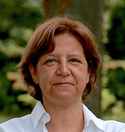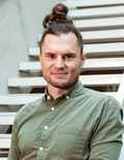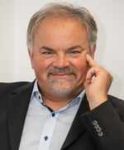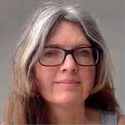
Sylvia Knapp
Medical University of Vienna
PL-01: Determinants of pulmonary immune homeostasis
Thursday, 19 September 2024, 14:00 – 14:45
Sylvia Knapp, MD, PhD is Professor of Infection Biology at the Research Division of Infection Biology at the Medical University of Vienna. She studied Medicine in Vienna and Berlin, trained as internist and intensive care physician, and did a PhD in Experimental Medicine at the Univ. of Amsterdam. Her research interests pertain to innate immune mechanisms in the course of infections, with a focus on fundamental aspects of lung macrophage plasticity, functionality and development in disease and homeostasis.

Günter Klambauer
Johannes Kepler University Linz
PL-02: Large language models and artificial intelligence in medicine and healthcare
Friday, 20 September 2024, 14:00 – 14:45
After studying mathematics and biology at the University of Vienna, Günter Klambauer
began his research work in the field of machine learning and artificial intelligence at the
Johannes Kepler University Linz in 2010, where he obtained his doctorate in 2014. For his
application of machine learning techniques in genetics and molecular biology, he was
honored with the Austrian Life Science Award 2012 and the Award of Excellence of the
Austrian Ministry of Science in 2014.
The “Self-normalizing neural networks” he developed were incorporated into Apple’s Siri
speech recognition system in 2020, and major pharmaceutical companies such as
Johnson&Johnson, Astra Zeneca and Merck use AI systems developed by his group. As a
distinguished researcher in the European Network of Excellence ELLIS, he has been leading
the “Machine Learning for Molecule Discovery” program as Director since 2023.
Günter Klambauer is professor for “AI in Life Sciences” at the LIT AI Lab and the Institute for
Machine Learning at the Johannes Kepler University Linz. He was instrumental in the
introduction of the “Artificial Intelligence” degree program at the JKU, holds the central
lectures “Deep Learning and Neural Networks” and heads the “Artificial Intelligence in Life
Sciences” branch of study.

Jürgen Knoblich
Senior Scientist at IMA-Institute of Molecular Biotechnology (Vienna, Austria)
PL-03: Modeling neural network parthology in cerebral organoids
Friday, 20 September 2024, 16:45 – 17:30
Jürgen Knoblich started his scientific career as a graduate student at the Max Planck Institute
in Tübingen where he worked on cell cycle control in Drosophila under the guidance of
Christian Lehner. In 1994 he moved to San Francisco to join the laboratory of Yuh Nung and
Lily Jan where he discovered his interest in asymmetric cell division, a topic that has remained
the main focus of his research ever since. In 1997, Jürgen Knoblich returned to Europe to
become a group leader at the Institute of Molecular Pathology (I.M.P.) in Vienna, Austria. In
2004, he moved next door to the newly founded Institute of Molecular Biotechnology of the
Austrian Academy of Sciences (IMBA). He became a senior scientist and was appointed
deputy director of the institute in 2005 and director from 2018 -2024.
Jürgen Knoblich has received several awards such as the Wittgenstein prize, the Schroedinger
award, the FEBS anniversary award and the Hans Krebs medal. He is a member of
the European Molecular Biology Organisation (EMBO), the Austrian Academy of Sciences, the
Pontifical Academy of Sciences and the Board of Directors of ISSCR (International Society for
Stem Cell Research). He acts on the EMBO council and the editorial boards of Current Biology,
Current Opinion in Cell Biology and the Journal of Cell Biology.

Veronica Egger
University of Regensburg, Institute of Zoology/Neurophysiology
PL-04: From the role of reciprocal synapses in the olfactory bulb to the discovery of fast heartbeat interoception: How to ‘feel the pulse’ within the brain
Saturday, 21 September 2024, 10:30 – 11:15
Veronica Egger obtained a diploma in physics at TU Munich and then a doctorate on the neurophysiology of spiny stellate cells in rat barrel cortex with Bert Sakmann and Dirk Feldmeyer in Heidelberg, before beginning to investigate olfactory bulb granule cells with Zach Mainen and Karel Svoboda in Cold Spring Harbor. Back in Germany, she joined the Physiological Institute and then the Biology department at LMU Munich and became a BMBF junior research group leader before accepting her current professorship at Regensburg University. Her research interests are centered on understanding the operation and function of the reciprocal granule cell spine. She is treasuress of the German Neuroscientific Society and speaker of the DFG-funded research unit “Modulation of olfaction”.


